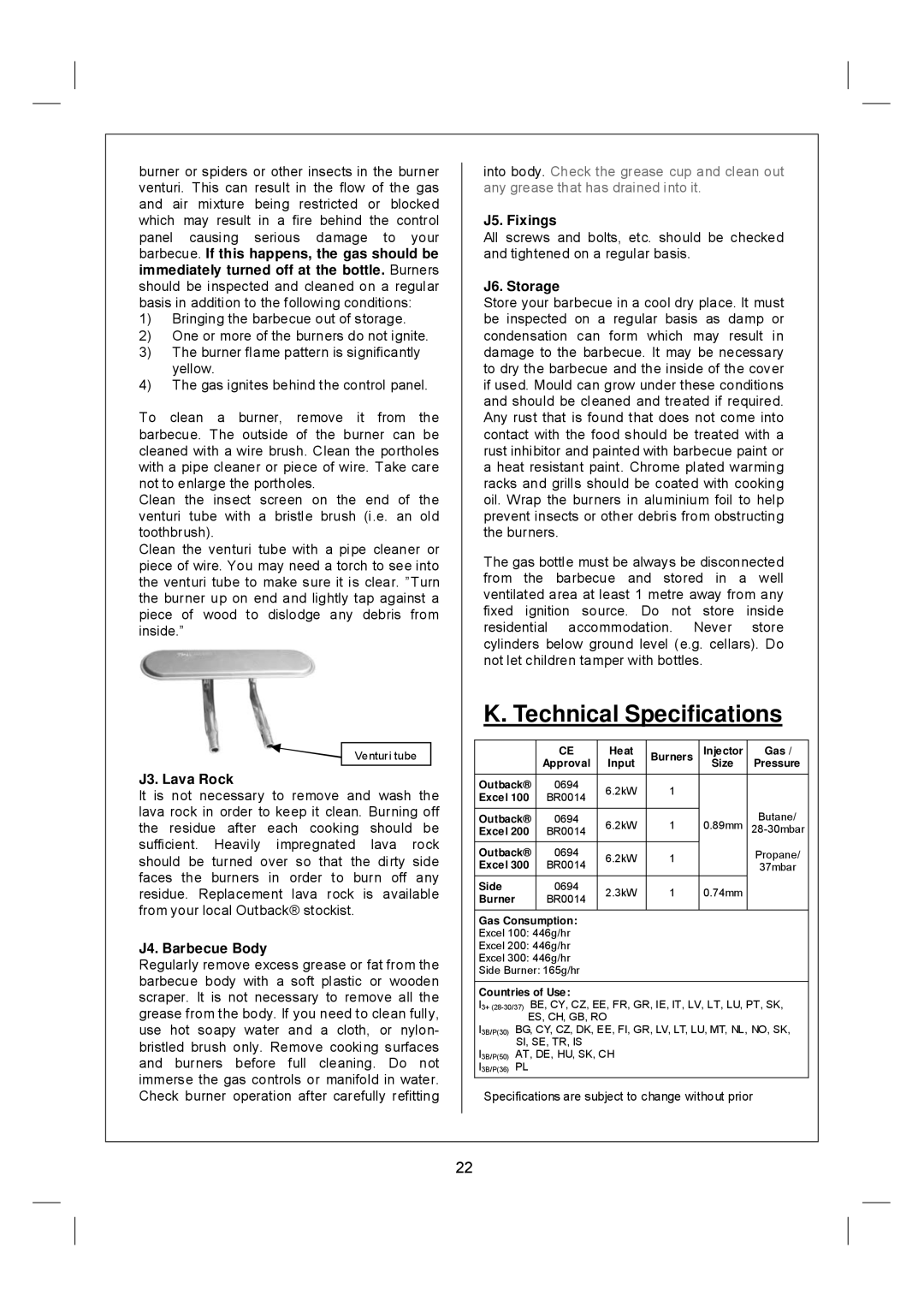
burner or spiders or other insects in the burner venturi. This can result in the flow of the gas and air mixture being restricted or blocked which may result in a fire behind the control panel causing serious damage to your barbecue. If this happens, the gas should be immediately turned off at the bottle. Burners should be inspected and cleaned on a regular basis in addition to the following conditions:
1)Bringing the barbecue out of storage.
2)One or more of the burners do not ignite.
3)The burner flame pattern is significantly yellow.
4)The gas ignites behind the control panel.
To clean a burner, remove it from the barbecue. The outside of the burner can be cleaned with a wire brush. Clean the portholes with a pipe cleaner or piece of wire. Take care not to enlarge the portholes.
Clean the insect screen on the end of the venturi tube with a bristle brush (i.e. an old toothbrush).
Clean the venturi tube with a pipe cleaner or piece of wire. You may need a torch to see into the venturi tube to make sure it is clear. ”Turn the burner up on end and lightly tap against a piece of wood to dislodge any debris from inside.”
Venturi tube
J3. Lava Rock
It is not necessary to remove and wash the lava rock in order to keep it clean. Burning off the residue after each cooking should be sufficient. Heavily impregnated lava rock should be turned over so that the dirty side faces the burners in order to burn off any residue. Replacement lava rock is available from your local Outback® stockist.
J4. Barbecue Body
Regularly remove excess grease or fat from the barbecue body with a soft plastic or wooden scraper. It is not necessary to remove all the grease from the body. If you need to clean fully, use hot soapy water and a cloth, or nylon- bristled brush only. Remove cooking surfaces and burners before full cleaning. Do not immerse the gas controls or manifold in water. Check burner operation after carefully refitting
into body. Check the grease cup and clean out any grease that has drained into it.
J5. Fixings
All screws and bolts, etc. should be checked and tightened on a regular basis.
J6. Storage
Store your barbecue in a cool dry place. It must be inspected on a regular basis as damp or condensation can form which may result in damage to the barbecue. It may be necessary to dry the barbecue and the inside of the cover if used. Mould can grow under these conditions and should be cleaned and treated if required. Any rust that is found that does not come into contact with the food should be treated with a rust inhibitor and painted with barbecue paint or a heat resistant paint. Chrome plated warming racks and grills should be coated with cooking oil. Wrap the burners in aluminium foil to help prevent insects or other debris from obstructing the burners.
The gas bottle must be always be disconnected from the barbecue and stored in a well ventilated area at least 1 metre away from any fixed ignition source. Do not store inside residential accommodation. Never store cylinders below ground level (e.g. cellars). Do not let children tamper with bottles.
K. Technical Specifications
| CE | Heat | Burners | Injector | Gas / |
| Approval | Input |
| Size | Pressure |
Outback® | 0694 | 6.2kW | 1 |
|
|
Excel 100 | BR0014 |
|
| ||
|
|
|
| ||
Outback® | 0694 | 6.2kW | 1 | 0.89mm | Butane/ |
Excel 200 | BR0014 | ||||
|
|
|
|
|
|
Outback® | 0694 | 6.2kW | 1 |
| Propane/ |
Excel 300 | BR0014 |
| 37mbar | ||
|
|
| |||
Side | 0694 | 2.3kW | 1 | 0.74mm |
|
Burner | BR0014 |
| |||
|
|
|
| ||
|
|
|
|
|
|
Gas Consumption:
Excel 100: 446g/hr
Excel 200: 446g/hr
Excel 300: 446g/hr
Side Burner: 165g/hr
Countries of Use:
I3+
I3B/P(30) BG, CY, CZ, DK, EE, FI, GR, LV, LT, LU, MT, NL, NO, SK, SI, SE, TR, IS
I3B/P(50) AT, DE, HU, SK, CH
I3B/P(36) PL
Specifications are subject to change without prior
22
